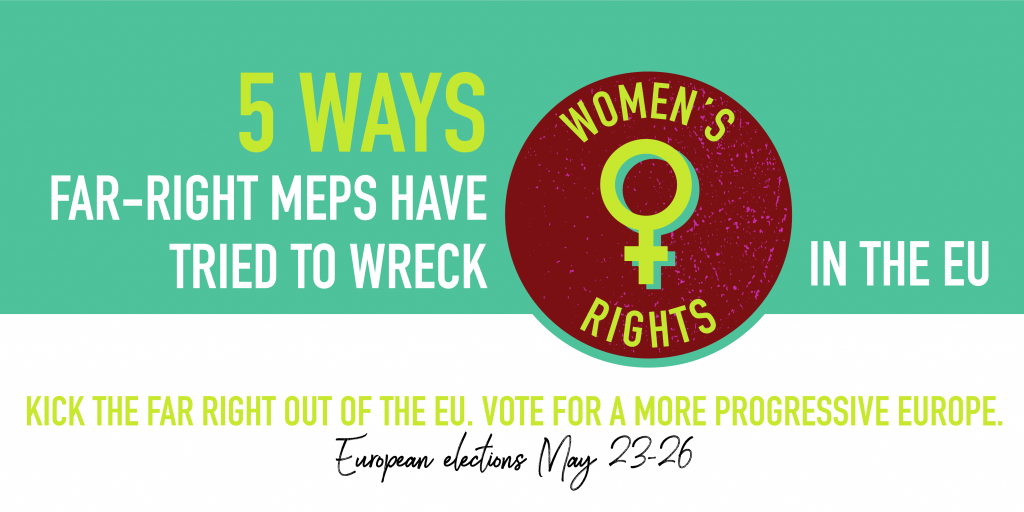At the moment, there are 175 Members of the European Parliament (MEPs)who we consider to be far-right, or who represent far-right national governments. They are members of three political blocs – the European Conservatives and Reformists, Europe for Freedom and Direct Democracy, and Europe of Nations and Freedom, as well as a number of ‘non-attached’ MEPs who don’t sit with any bloc.
Polling suggests that after this year’s European elections in May, this number could increase substantially. This would be a huge problem for our rights and environmental protection across Europe. Today, we’re looking at one of those issues in more detail – women’s rights.
Why would the far-right having more power in the European Parliament be bad news for women?
1. They consistently vote against measures to improve women’s rights.
The European Parliament plays a crucial role in the EU to hold the European Commission and the EU member states to account. So when they were both weakening blocking updating important pieces of new legislation for improving maternity leave rights, the European Parliament stepped in to get the process back on track.
However, 78% of far-right MEPs either voted against doing this, or abstained entirely. Fortunately, the resolution as a whole passed with 64% of MEPs who voted in support. It’s easy to see how similar initiatives would fail with a stronger far-right presence in the Parliament.
2. Even after #MeToo, they block anti-harassment training for all MEPs.
The European Parliament, like any other institution, began the process of reckoning with the #MeToo movement in 2018, with survivors of sexism, sexual harassment and sexual assault coming forward via the MeTooEP website.
Progressive MEPs tried to start addressing this by proposing that all new MEPs should undergo mandatory sexual harassment training – but this was rejected by the far-right and even by groups on the supposedly moderate right.
3. They’re openly sexist, and use their platform in Brussels to amplify their dangerous ideas.
In 2017, a far-right Polish MEP used his speaking time in the European Parliament to claim “[women are] weaker, they are smaller, they are less intelligent”.
4. Their track record in non-legislative votes gives a dark hint of the kind of laws they would support in the future.
By the time most votes on new laws reach a plenary vote in the European Parliament, they have usually gone through several rounds of amendments by MEPs in different committees – meaning you tend to end up with a proposal that commands broad support and passes easily.
So when you’re looking for what the far-right has done to undermine progressive laws, looking at plenary votes isn’t always helpful.
Instead, you can look at how they voted on non-legislative votes where the Parliament agrees its opinion on an issue. These give a window into what sort of amendments MEPs may support when new laws are being put together.
Last year, MEPs voted on a report on ‘women, gender equality and climate justice’ that brings together the issues of gender equality and climate change. The resolution both denounces the fact that women are disproportionately affected by climate change, and affirms that their empowerment is key to solving the issue.
80% of far-right MEPs voted against it or abstained. None of the 37 MEPs from the Europe of Nations and Freedom group voted in favour of it – and this group is projected to almost double to 60 members in the new Parliament.
With the threat of climate catastrophe looming, the last thing we need is political representatives who don’t understand how it disproportionately affects women. (We’ll look at the far-right’s track record on the climate in a future blog.)
5. Wherever they get into power in national or local government, they make life worse for women.
Many far-right MEPs are members of parties which are already in power at the national level, and are trying to roll back progress for women’s rights. What these parties do back home gives us a glimpse of what they would do with more power in the EU.
Whether that’s the Istanbul convention on preventing and combating violence against women not being ratified in Bulgaria, the Polish government trying to restrict women’s access to abortion services, Italian interior minister Matteo Salvini pursuing a “terrifying campaign” of sexist attacks against a female political opponent (including attending a rally with a sex doll which he told his supporters represented her), or Croatia’s institutional failure to respond to obstetric violence, their actions paint a frightening picture for women if they gain further power in and across the EU.
We need a Europe which cares about women’s rights and protects all women. In this May’s European elections, we need to vote for people and parties who will fight for gender equality.
The upcoming elections are a chance to send a loud message that we need a better Europe where gender equality is a top priority.
To keep up-to-date on the European Elections, sign up at www.ttimv.eu/EuropeWeWant







